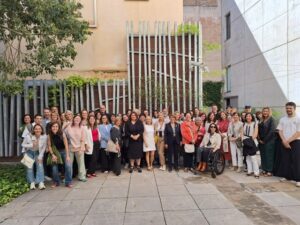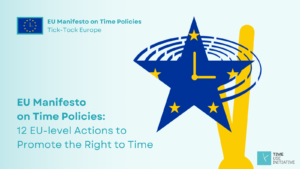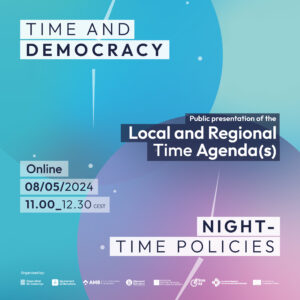Therefore, time use during COVID-19 crisis has become an important research phenomenon and several surveys and researches are being launched all over the world these days, many of them with the aim to capture the most immediate changes caused in time management by the pandemic but also how it is affecting our wellbeing.
The Barcelona Time Use Initiative for a Healthy Society has the mission of gathering the most relevant information, actions and networks activity related to Time Use Policies both at a local and international level. So, given the current pandemic context, it is collecting information on the main research initiatives related to COVID-19 and Time Use Policies
To begin with, the TOR research group for the study of time, culture and society side, based in the Vrije Universiteit of Brussels, has launched an international survey for individuals to know how does the coronavirus affect our daily life, while the CEAS UMayor (Centro de Economía y Políticas Sociales de la Universidad Mayor) of Santiago de Chile has also launched a similar one but only for people living in the country. Only within Spain reach, some researchers from the Universidad Politécnica de Madrid have also launched a questionnaire on time use changes during the coronavirus lockdown. QUIT UAB (Center for Sociological Studies on Daily Life and Work of the Universitat Autónoma de Barcelona) has also launched a survey to capture how confinement affects the distribution of time and work at home during the COVID19 lockdown, within Catalan area reach.
On its side, the CEO (Center of Opinion Studies) of the Generalitat of Catalonia (Catalan regional government), with the assessment of the Time Use Reform Office, has just launched a survey on time use during lockdown to be answered by citizens over 15 in Catalonia.
As to study the effect of the coronavirus lockdown on our body clock and our circadian rhythm, with the support of The Society for Research on Biological Rhythms, Dr. Maria Korman (University of Ariel, Israel) and Prof. Till Roenneberg (LMU Munich and Chronsulting, Germany) have set up an online questionnaire, to know which are the changes in habits and behaviors and their effects on biological rhythms and sleep.
More specifically on the effects of lockdown on children sleep, Gonzalo Pin from the Quiron Clinic in Valencia, has launched a survey, only for people living in Spain, in the frame of a wider research to be carried on the issue.
Regarding the effects of COVID19 lockdown in general wellbeing, at a European level, the Eurofound (European Foundation for the Improvement of Living and Working conditions) have launched a quick survey to enquire on the effects of the COVID-19 pandemic on people’s quality of life and work so as to capture the most immediate changes and impact. With a similar general scope of tackling the impacts of the pandemic in wellbeing, but also including the time factor, from the What works Center for Wellbeing based in the UK, there is a call for research collaborations of the wellbeing impacts of the pandemic on daily life.
As for the effects of the pandemic on education, the Fundación Jaume Bofill, with Catalan reach, has launched a proposal agenda for education facing the COVID-19 crisis that includes some recommendations regarding time and timetable changes at schools.
Changes in organizations’ culture
However, time use changes research is not only focused on impacts on individuals; companies and organizations are also experiencing big changes related with time use, work organization, HR management and the challenge of implementing remote work.
The London and the Harvard Business Schools together are launching a research on how new technologies are helping the way work gets done in companies and organizations now so to adapt to the new situation, with the goal of helping organizations and employees to cultivate an agile work culture, in the frame of what has been denominated as psychosocial responsibility.
On its side, the consultancy organization In Time has the aim to help companies to know and improve the situation of people on their team who these days are at home teleworking or simply confined, through this questionnaire, which can also be filled in its Spanish and Catalan versions.
As for Spain, ARHOE-Comisión Nacional para la Racionalización de los Horarios Españoles, they have also launched a survey for companies to know about how they are adapting to the current situation regarding time management and work organisation.
At a Catalan level, the Pacte del Temps (Time Agreement) initiative of the Barcelona City Council, has set a call to gather good practices from companies regarding remote work and work organisation during the pandemic.
The Barcelona Time Use Initiative for a Healthy Society hopes that several initiatives will be launched and it strongly believes they can all contribute to get relevant information so that this crisis would also become an opportunity for further learning about the effects of a different time use in our wellbeing and in the achievement of a healthier society, regardless of the circumstances.








